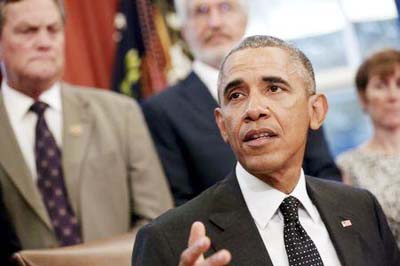
Reuters, Washington :As he weighed whether to support President Barack Obama’s nuclear deal with Iran, Representative Donald Norcross was showered with the sort of attention rarely shown to junior members of the U.S. Congress.The New Jersey Democrat, a former labor union leader, met with Obama and other Democrats twice in the White House. He listened to briefings by Secretary of State John Kerry, Energy Secretary Ernest Moniz and senior Defense Department officials.He took an all-expenses-paid trip to Israel, where Prime Minister Benjamin Netanyahu spent two hours with him and 21 other Democratic lawmakers, picking out faults in the agreement that Israel opposes. Voters from Norcross’s south New Jersey district flooded his office with phone calls and emails and buttonholed him in person.On Tuesday, Norcross said he would oppose the deal on the grounds that it does not go far enough to prevent Iran from developing a nuclear weapon. All the attempts at persuasion gave him the information he needed to make up his mind, he said, adding that the politics of the debate weren’t a factor.”People really know at a gut level that if anybody tries to bring politics into it, (that’s) way off base,” he said in an interview with Reuters.As the minority party, Norcross and his fellow Democrats are often sidelined on Capitol Hill. But over the past month they have been the targets of a multi-million dollar lobbying campaign as they weigh one of the most consequential foreign-policy decisions in years. The intense pressure appears to have made the outcome of next month’s votes on the deal closer than expected as some Democrats are persuaded to break ranks with Obama.Congress, where majority Republicans overwhelmingly oppose the deal, is expected to reject the pact next month. But Obama will still be able to save the agreement if he can deny opponents in either house the two-thirds majority needed to override his expected veto.The fate of the deal now hinges on the votes of the 18 Democratic senators and roughly 100 Democratic House members who have yet to say how they will vote. The U.S.-led international agreement reached in July would put new limits on Iran’s nuclear program in exchange for lifting crippling economic sanctions on the country.On one side of the lobbying effort are progressive groups who back Obama’s view that the deal is the best chance to avoid another Middle East war. On the other side, with a larger war chest, are many Jewish-American groups that say the deal has dangerous loopholes and fear it will empower Iran and ultimately leave Israel vulnerable to nuclear attack.Norcross came out against the deal at a synagogue in his district, where he was joined on stage by an Israeli official and a lobbyist for the American Israel Public Affairs Committee (AIPAC), a powerful pro-Israel group that opposes the pact.

